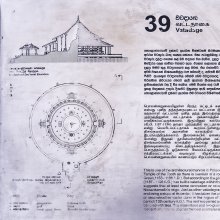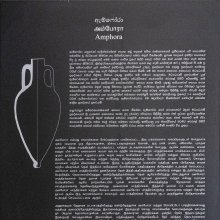Atu, Ātu: 13 definitions
Introduction:
Atu means something in Hinduism, Sanskrit, Buddhism, Pali, the history of ancient India, Marathi, biology, Tamil. If you want to know the exact meaning, history, etymology or English translation of this term then check out the descriptions on this page. Add your comment or reference to a book if you want to contribute to this summary article.
Images (photo gallery)
In Hinduism
Vyakarana (Sanskrit grammar)
Source: Wikisource: A dictionary of Sanskrit grammarAtu (अतु).—Short term used by Pāṇini to signify together the five affixes क्तवतु, ड्वतुप्, ड्मतुप् मतुप् (ktavatu, ḍvatup, ḍmatup matup) and वतुप् (vatup) ;cf.अत्वसन्तस्य चाधातोः (atvasantasya cādhātoḥ) P. VI.4.14.

Vyakarana (व्याकरण, vyākaraṇa) refers to Sanskrit grammar and represents one of the six additional sciences (vedanga) to be studied along with the Vedas. Vyakarana concerns itself with the rules of Sanskrit grammar and linguistic analysis in order to establish the correct context of words and sentences.
India history and geography
Source: Cologne Digital Sanskrit Dictionaries: Indian Epigraphical GlossaryAṭu.—(Chamba), a land measure. Cf. jilo, etc. Note: aṭu is defined in the “Indian epigraphical glossary” as it can be found on ancient inscriptions commonly written in Sanskrit, Prakrit or Dravidian languages.

The history of India traces the identification of countries, villages, towns and other regions of India, as well as mythology, zoology, royal dynasties, rulers, tribes, local festivities and traditions and regional languages. Ancient India enjoyed religious freedom and encourages the path of Dharma, a concept common to Buddhism, Hinduism, and Jainism.
Biology (plants and animals)
Source: Google Books: CRC World Dictionary (Regional names)Atu in Nigeria is the name of a plant defined with Pterocarpus soyauxii in various botanical sources. This page contains potential references in Ayurveda, modern medicine, and other folk traditions or local practices It has the synonym Pterocarpus casteelsii var. ealaensis Hauman (among others).
Example references for further research on medicinal uses or toxicity (see latin names for full list):
· Hooker’s Icones Plantarum (2369)
· Fl. Congo Belge (1954)
· Ann. Soc. Sci. Bruxelles (1924)
· International Journal of Molecular Medicine and Advance Sciences (2007)
· Selectarum Stirpium Americanarum Historia (1763)
· Bulletin du Jardin Botanique de l’État (1954)
If you are looking for specific details regarding Atu, for example health benefits, side effects, diet and recipes, extract dosage, chemical composition, pregnancy safety, have a look at these references.

This sections includes definitions from the five kingdoms of living things: Animals, Plants, Fungi, Protists and Monera. It will include both the official binomial nomenclature (scientific names usually in Latin) as well as regional spellings and variants.
Languages of India and abroad
Pali-English dictionary
Source: Sutta: The Pali Text Society's Pali-English DictionaryĀtu, (dialectical) father M. I, 449 (cp. Trenckner’s note on p. 567: the text no doubt purports to make the woman speak a sort of patois). (Page 98)

Pali is the language of the Tipiṭaka, which is the sacred canon of Theravāda Buddhism and contains much of the Buddha’s speech. Closeley related to Sanskrit, both languages are used interchangeably between religions.
Marathi-English dictionary
Source: DDSA: The Molesworth Marathi and English Dictionaryātū (आतू).—f (āta) A respectful term of compellation or mention for a paternal aunt.
Marathi is an Indo-European language having over 70 million native speakers people in (predominantly) Maharashtra India. Marathi, like many other Indo-Aryan languages, evolved from early forms of Prakrit, which itself is a subset of Sanskrit, one of the most ancient languages of the world.
Sanskrit dictionary
Source: DDSA: The practical Sanskrit-English dictionaryĀtu (आतु).—[at-uṇ] A raft, float.
Derivable forms: ātuḥ (आतुः).
Source: Cologne Digital Sanskrit Dictionaries: Shabda-Sagara Sanskrit-English DictionaryĀtu (आतु).—m.
(-tuḥ) A raft, a float. E. āṅ, tṛ to cross, and ḍu aff.
Source: Cologne Digital Sanskrit Dictionaries: Monier-Williams Sanskrit-English DictionaryĀtu (आतु):—m. = āḍū q.v., [cf. Lexicographers, esp. such as amarasiṃha, halāyudha, hemacandra, etc.]
Source: Cologne Digital Sanskrit Dictionaries: Yates Sanskrit-English DictionaryĀtu (आतु):—(tuḥ) 2. m. A raft.
[Sanskrit to German]
Sanskrit, also spelled संस्कृतम् (saṃskṛtam), is an ancient language of India commonly seen as the grandmother of the Indo-European language family (even English!). Closely allied with Prakrit and Pali, Sanskrit is more exhaustive in both grammar and terms and has the most extensive collection of literature in the world, greatly surpassing its sister-languages Greek and Latin.
Kannada-English dictionary
Source: Alar: Kannada-English corpusĀṭu (ಆಟು):—
1) [verb] to cause to dangle or oscillate; to swing.
2) [verb] to pass; to go forward.
--- OR ---
Āṭu (ಆಟು):—
1) [adverb] (corrupt form of ಅಷ್ಟು [ashtu]) 1. that much.
2) [adverb] to that extent.
--- OR ---
Ātu (ಆತು):—[verb] p.p. of ಆನ್ [an]1.
Kannada is a Dravidian language (as opposed to the Indo-European language family) mainly spoken in the southwestern region of India.
Tamil dictionary
Source: DDSA: University of Madras: Tamil LexiconAṭu (அடு) [aṭuttal] [Telugu: aṇṭu, K. aṭṭu, M. aṭukka, Travancore usage aṇṭu.] 11 intransitive verb
1. To be next, near; சமீபமாதல். அடுத்த நாட் டரசியல் புடைய [samipamathal. adutha nad darasiyal pudaiya] (கம்பராமாயணம் விபீடண. [kambaramayanam vipidana.] 82).
2. To be fit, becoming, deserving; ஏற்றதாதல். இஃது உனக்கடுத்ததன்று. [errathathal. iqthu unakkaduthathanru.]
3. To happen, occur; சம்பவித்தல். ஆவிநைந்திற வடுத்ததென் [sambavithal. avinainthira vaduthathen] (கம்பராமாயணம் நகர்நீ. [kambaramayanam nagarni.] 14).
4. To dance; கூத்தாடுதல். (பிங்கலகண்டு) [kuthaduthal. (pingalagandu)] — transitive verb
1. To join; சார்தல். முனிவர்யாரு மடுத்திடு மவைக்க ணெய்தி [sarthal. munivaryaru maduthidu mavaikka neythi] (கந்தபு. ததீசியுத். [kanthapu. thathisiyuth.] 39).
2. To join together; சேர்த்தல். வெண்டுகி லடுத்து [serthal. vendugi laduthu] (சீவகசிந்தாமணி [sivagasindamani] 617).
3. To approach, approximate to, come in contact with; கிட்டுதல். மயிலன்னா ளடுத்து வயமா ருதியை [kittuthal. mayilanna laduthu vayama ruthiyai] (மகாபாரதம் மணிமா. [magaparatham manima.] 3).
4. To seek protection from; ஆதாரமாகப் பற்றுதல். அடுத்தவனைக் கெடுக்க லாமா [atharamagap parruthal. aduthavanaig kedukka lama]?
5. To give; கொடுத்தல். வளைக்கரத்தார்க் கடுத் தோம் [koduthal. valaikkarathark kaduth thom] (திருக்கோவையார் [thirukkovaiyar] 357).
6. To press down; அமுக் குதல். எடுத்தான் புயந்தன்னை யடுத்தார் மருதரை [amug kuthal. eduthan puyanthannai yaduthar marutharai] (தேவாரம் [thevaram] 447, 8).
7. To assign; ஒப்புவித்தல். [oppuvithal.] (S.I.I. ii, 250.)
--- OR ---
Aṭu (அடு) [aṭutal] 6 transitive verb [K. aḍu, M. aṭuka.]
1. To cook, dress, as food, roast, fry; சமைத்தல். அமுதமடு மடைப்பள்ளி [samaithal. amuthamadu madaippalli] (கல்லாடம் [kalladam] 13).
2. To boil; காய்ச்சுதல். அட்டாலும் பால்சுவையிற் குன்றாது [kaychuthal. attalum palsuvaiyir kunrathu] (மூது ரை [muthu rai], 4).
3. To melt; உருக்குதல். அட்டொளி யரத்த வாய்க் கணிகை [urukkuthal. attoli yaratha vayk kanigai] (சீவகசிந்தாமணி [sivagasindamani] 98).
4. To pound, as rice; குற்றுதல். வித்தட் டுண்டனை [kurruthal. vithad dundanai] (புறநானூறு [purananuru] 227).
5. To conquer, subdue, as the senses, paṣsions; வெல்லுதல். ஐம்பொறியு மட்டுயர்ந்தார் [velluthal. aimboriyu mattuyarnthar] (சீவகசிந்தாமணி [sivagasindamani] 1468).
6. To trouble, afflict; வருத்துதல். கழிபசி நோய டக் கவலும் பூதரும் [varuthuthal. kazhipasi noya dag kavalum putharum] (கந்தபு. சூரனமை. [kanthapu. suranamai.] 59).
7. To destroy, consume; அழித்தல். எல்லாப் புவனமும் . . . அடுபவர் [azhithal. ellap puvanamum . . . adupavar] (கந்தபு. ஏமகூ. [kanthapu. emagu.] 18).
8. To kill; கொல்லுதல். அடுநை யாயினும் [kolluthal. adunai yayinum] (புறநானூறு [purananuru] 36).
--- OR ---
Atu (அது) pronominal < அ. [a.] That, the thing remote from the speaker, generally used before a consonant; அஃறிணையொருமைச்சுட்டுப்பெயர். [aqrinaiyorumaichuttuppeyar.]
--- OR ---
Atu (அது) particle
1. A gen. ending followed by a neutral singular, as in எனது முகம்; ஆறாம் வேற்றுமையின் ஓர் உருபு. [enathu mugam; aram verrumaiyin or urupu.] (நன். [nan.] 300.)
2. An expletive suffix; பகுதிப்பொருற் விகுதிகளுள் ஒன்று. உருவினுயிர் வடிவதுவு முணர்ந்திலர் [paguthipporur viguthigalul onru. uruvinuyir vadivathuvu munarnthilar] (சிவஞானசித்தியார் சுபக்ஷம் [sivagnanasithiyar supagsham] 8, 36).
--- OR ---
Āṭu (ஆடு) [āṭutal] [Telugu: Kanarese, Malayalam: Travancore usage āḍu.] 5 intransitive verb
1. To move, wave, swing, shake, vibrate; அசைதல். [asaithal.]
2. To dance, gesticulate, to act a part or play; கூத்தாடுதல். (பிங்கலகண்டு) [kuthaduthal. (pingalagandu)]
3. To play, sport; விளையாடுதல். [vilaiyaduthal.] (மணிமேகலை [manimegalai] 10, 55.)
4. To bathe, play in water; நீராடுதல். பூக்கமழ் பொய்கை யாடச் சென்றோன் [niraduthal. pukkamazh poykai yadas senron] (மணிமேகலை [manimegalai] 17, 32).
5. To war, fight, join in battle; பொருதல். மற்றவனோடாடி . . . மாய்ந்ததனை [poruthal. marravanodadi . . . maynthathanai] (கந்தபு. சிங்கமு. [kanthapu. singamu.] 460).
6. To go, proceed, wander about, pass to and fro; சஞ்சரித்தல். [sancharithal.] (கலித்தொகை [kalithogai] 41, 25.)
7. To practise, persevere, make continued exertion; முயலுதல். இளையானே . . . ஆடுமகன் [muyaluthal. ilaiyane . . . adumagan] (பழமலையந்தாதிொ. [pazhamo.] 150).
8. To be born; பிறத்தல். மாசை மாக்கடன் மன்னவ னாடலின் [pirathal. masai makkadan mannava nadalin] (சீவகசிந்தாமணி [sivagasindamani] 911). — transitive verb
1. To say; சொல்லுதல். அவர் சொல்லியவாறே யாடினார் [solluthal. avar solliyavare yadinar] (திருவிளையாடற் புராணம் விறகு. [thiruvilaiyadar puranam viragu.] 61).
2. To do, perform; செய்தல். அமராடுதல் [seythal. amaraduthal] (பிரபோதசந்திரோதயம் [pirapothasandirothayam] 27, 21).
3. To enjoy; அனுபவித்தல். [anupavithal.] (சிலப்பதிகாரம் அரும்பதவுரை பதிக. [silappathigaram arumbathavurai pathiga.] 16.)
4. To rub, besmear, as sandal paste; பூசுதல். ஆடிய சாந்தமும் [pusuthal. adiya santhamum] (மணிமேகலை [manimegalai] 16, 31).
5. To wallow in; அளைதல். இருநிலக் கரம்பை படுநீ றாடி [alaithal. irunilag karambai paduni radi] (பத்துப்பாட்டு: பெரும்பாணாற்றுப்படை [pathuppattu: perumbanarruppadai] 93).
--- OR ---
Āṭu (ஆடு) noun < அடு²-. [adu²-.]
1. Killing, ruining; கொல்லுகை. ஆடுகொள்வென்றி [kollugai. adugolvenri] (புறநானூறு [purananuru] 67).
2. Cooking, boiling; சமைக்கை. ஆடுநனி மறந்த கோடுய ரடுப்பின் [samaikkai. adunani marantha koduya raduppin] (புறநானூறு [purananuru] 164).
3. Distillation; காய்ச்சுகை. அறாஅநிலைச் சாடி யாடுறு தேறல் [kaychugai. araanilais sadi yaduru theral] (புறப்பொருள்வெண்பாமாலை [purapporulvenpamalai] 1, 2).
4. Victory, success; வெற்றி. ஆடுகொ ணேமியான் [verri. adugo nemiyan] (கலித்தொகை [kalithogai] 105, 70).
5. cf. யாடு. [yadu.] [Kanarese, Malayalam: āḍu, Travancore usage ēḍu.] The genus of which the sheep and the goat are species; விலங்கு வகை. [vilangu vagai.]
6. Aries, a sign of the Zodiac; மேடராசி. திண் ணிலை மருப்பி னாடு தலையாக [medarasi. thin nilai maruppi nadu thalaiyaga] (பத்துப்பாட்டு: நெடு [pathuppattu: nedu] 160).
--- OR ---
Ātu (ஆது) interjection Expression which a mahout uses while patting and quieting an elephant; பாகர் யானையைத் தட்டிக்கொடிக்கையிற் கூறும் ஒரு குறிப்புச் சொல். [pagar yanaiyaith thattikkodikkaiyir kurum oru kurippus sol.] (சீவகசிந்தாமணி [sivagasindamani] 1834.)
--- OR ---
Ātu (ஆது) particle < அது. [athu.] A gen. ending, followed by an impersonal singular; ஆறாம் வேற்றுமை யுருபு. [aram verrumai yurupu.] (நன். [nan.] 300.)
--- OR ---
Āṭu (ஆடு) [āṭutal] 5 intransitive verb
1. To be disconcerted; தடுமாறுதல். [thadumaruthal.] Pond.
2. To be crushed in a mill; யந்திர முதலியவற்றில் அரை படுதல். ஆடுகைக்குப் பக்குவமான கரும்புபோல இனிதாயிருக்கிற மொழியையும் [yanthira muthaliyavarril arai paduthal. adugaikkup pakkuvamana karumbupola inithayirukkira mozhiyaiyum] (நாலாயிர திவ்யப்பிரபந்தம் பெரிய.ாழ். [nalayira thivyappirapandam periyazh.] 2, 9, 5, வ்யா. பக். [vya. pag.] 464).
3. To fall; விழுதல். இவளிடையை யாசைப்பட்டாயிற்று கோட்டிடை யாடிற்று [vizhuthal. ivalidaiyai yasaippattayirru kottidai yadirru] (நாலாயிர திவ்யப்பிரபந்தம் பெரியதி. [nalayira thivyappirapandam periyathi.] 1, 2, 3, அரும். பக். [arum. pag.] 65).
4. To cohabit; புணர்தல். (நாமதீபநிகண்டு) [punarthal. (namathipanigandu)]
5. To be proud or conceited; செருக்குதல். [serukkuthal.] Colloq.
--- OR ---
Āṭu (ஆடு) noun < ஆடு-. (அகராதி நிகண்டு) [adu-. (agarathi nigandu)]
1. Dance; கூத்து. [kuthu.]
2. Sharpness; கூர்மை. [kurmai.]
--- OR ---
Ātu (ஆது) noun < ātu. Raft; தெப்பம். [theppam.] (W.)
Tamil is an ancient language of India from the Dravidian family spoken by roughly 250 million people mainly in southern India and Sri Lanka.
See also (Relevant definitions)
Starts with (+188): Atu-tinlap, Atuanbi, Atuarae, Atubadalena, Atubadalenavihara, Atuc, Atucatai, Atuccha, Atucchabana, Atuch, Atucil, Atucilaikkaram, Atud, Atudanem, Atudant, Atudintappalai, Atudita, Atufa, Atufio, Atuge.
Ends with (+1741): Aarnatu, Abdhatu, Abhikratu, Abiddhadhatu, Acaintatu, Acaippatu, Acaivatu, Acankauyatu, Acaratu, Acatiyatu, Acatu, Acciyatu, Accu-puttivilaiyatu, Acintyadhatu, Adalatu, Adatu, Adavudimatu, Adbhutakratu, Addacatu, Addamatu.
Full-text (+333): Adu, Jivatu, Atum, Atutinnappalai, Atumatu, Atumalai, Aadu sokada gida, Atu-tinlap, Aadu, Aadu kolli, Jungli aadu, Aadu muttada gida, Aadu soge, Kaiyatu, Kipaa-atu, Aadu balli, Heliopolis, Kshanatu, Vahatu, Sharatu.
Relevant text
Search found 15 books and stories containing Atu, Aadu, Aathu, Adhu, Adu, Athu, Ātu, Ātū, Aṭu, Āṭu; (plurals include: Atus, Aadus, Aathus, Adhus, Adus, Athus, Ātus, Ātūs, Aṭus, Āṭus). You can also click to the full overview containing English textual excerpts. Below are direct links for the most relevant articles:
Sivaprakasam (Study in Bondage and Liberation) (by N. Veerappan)
Main stages of liberation < [Chapter 7 - Liberation]
Liberation in different faiths < [Chapter 7 - Liberation]
Consequential bondages < [Chapter 2 - Bondage]
Tiruvaymoli (Thiruvaimozhi): English translation (by S. Satyamurthi Ayyangar)
Pasuram 1.6.10 < [Section 6 - Sixth Tiruvaymoli (Parivatu il icanai)]
Pasuram 6.10.7 < [Section 10 - Tenth Tiruvaymoli (Ulakam unta Peruvaya)]
Pasuram 2.6.5 < [Section 6 - Sixth Tiruvaymoli (Vaikunta Manivannane)]
Rig Veda (translation and commentary) (by H. H. Wilson)
Rig Veda 1.53.10 < [Sukta 53]
Temples in and around Madurantakam (by B. Mekala)
Mandradis (shepherd community) < [Chapter 6 - Social and Economic Activities]
Middle Chola Temples (by S. R. Balasubrahmanyam)
Temples in Sivapuram < [Chapter II - Temples of Rajaraja I’s Time]
A Manual of Khshnoom (by Phiroz Nasarvanji Tavaria)
Related products





